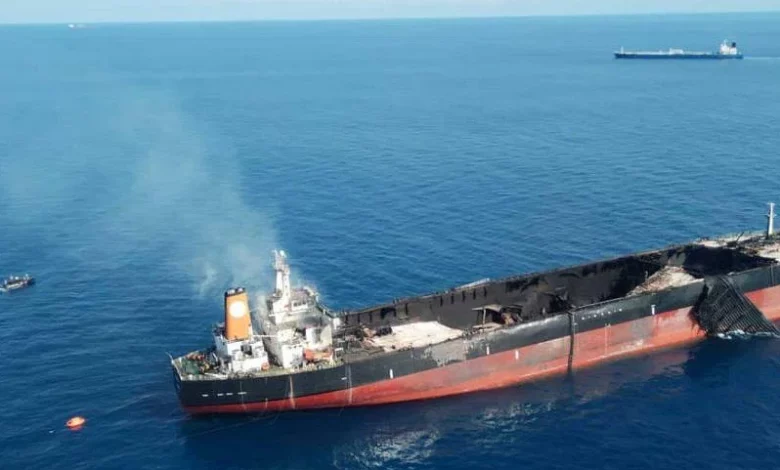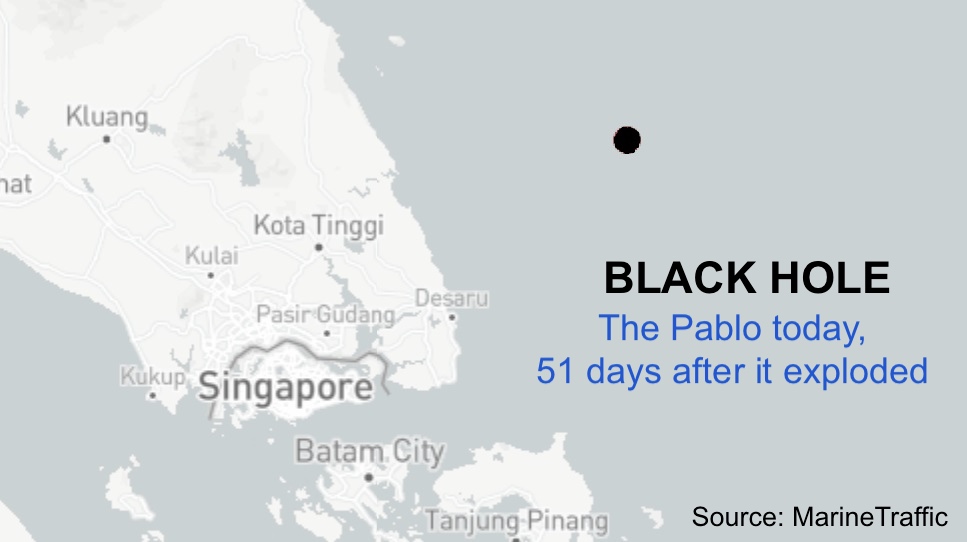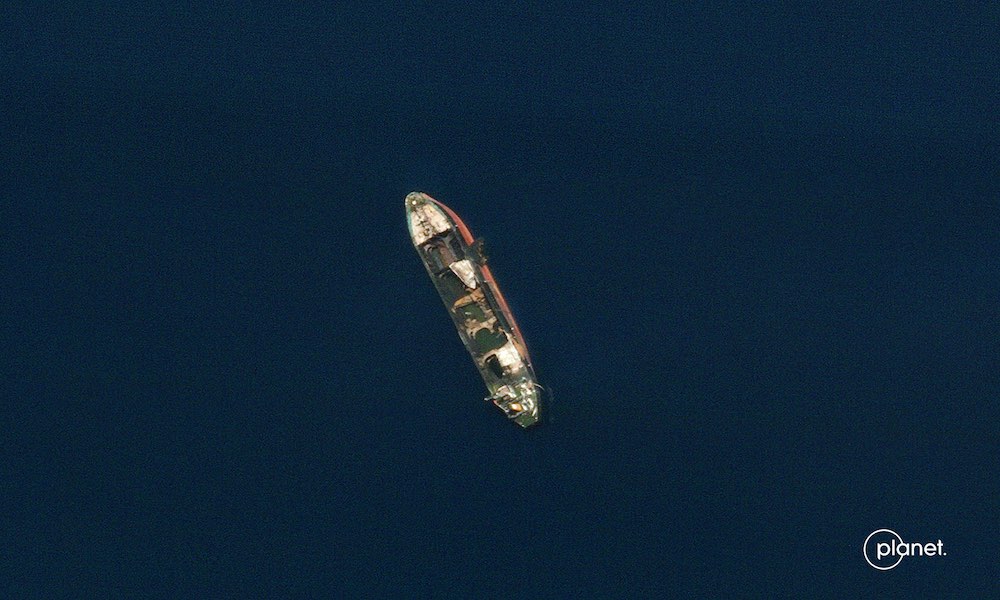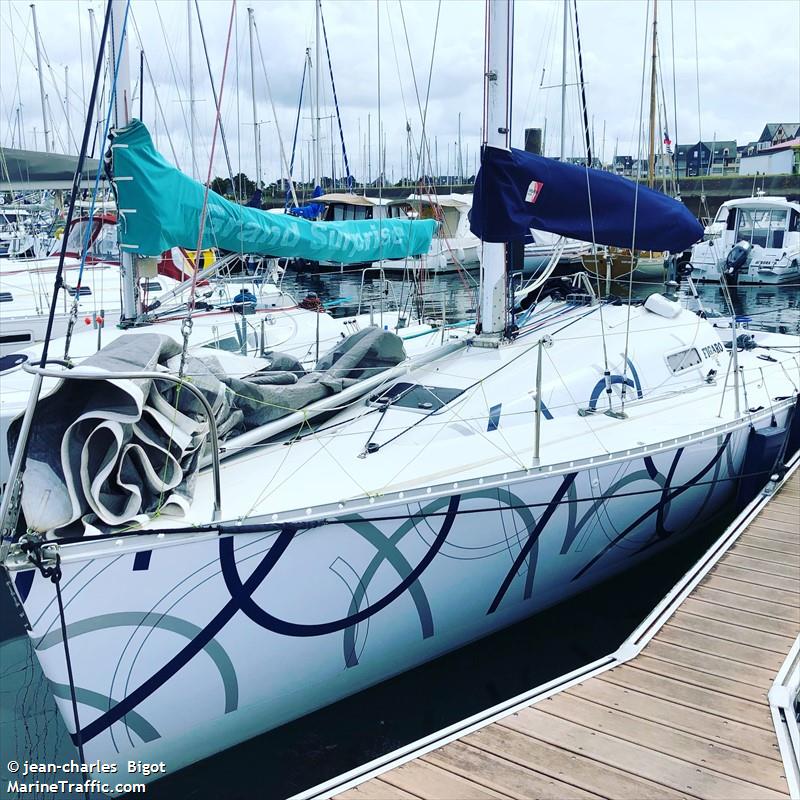
Fifty-one days since it exploded in Malaysian waters, killing three crew, the Pablo tanker remains alone, untended, with the authorities at a loss with what to do with the wreck, a sharp warning of the hugely damaging threat posed by the growth of the so-called dark fleet.
MarineTraffic data shows the ship remains at anchor off the coast of Malaysia today. Exclusive satellite images taken yesterday and sent to Splash by Planet Labs (see below) show the vessel and its severely damaged deck all by itself.

The 1997-built Pablo, a ship which has changed hands three times in the last couple of years, issued a distress call on May 1 after a blaze was detected. Malaysian authorities were able to rescue 25 of the 28 crew.
According to the ship’s captain, Lepyoskin Oleksandr, a fire broke out on the upper deck. The vessel was empty of oil, but the buildup of gas was enough to blow up its entire deck. Bunker fuel subsequently washed up on nearby shorelines.
Since 2018, TankerTrackers.com evidenced this vintage ship transfer 16m barrels of Iranian oil on 29 occasions.
The ship, registered in Gabon, a popular flag of choice for sanctions-busting companies, is listed as being owned by Marshall Islands-based Pablo Union Shipping, a single-ship shell company. Without any confirmed insurance, and with owners impossible to contact, the Malaysian authorities have been left in a quandary regarding what to do with the wreck. Multiple shipping databases list the ship’s insurance status as ‘Withdrawn’.
Officials from the Malaysia Maritime Enforcement Agency have yet to reply to questions sent by Splash earlier this week.
James Turner, a maritime lawyer with UK-based Quadrant Chambers, explained that in normal circumstances when a ship has been abandoned beyond economic repair, the hull insurer – once it has paid out – becomes its owner and has at least a financial interest in realising the vessel’s scrap value. If a ship has become a proper wreck whether sunk or stranded, then the Nairobi Wreck Removal Convention swings into action, an international convention that provides the basis for states to remove shipwrecks that may have the potential to adversely affect the safety of lives, goods and property at sea, as well as the marine environment.
“Unfortunately this ship is not yet a wreck in the Nairobi sense and there may be no effective hull insurer, or it may have refused to accept that the vessel is a constructive total loss,” Turner told Splash, adding: “As there is no cargo either, it may simply be that there is no one with an interest in the ship who has enough cash to pay a tug to take it to Alang for demolition.”
Mike Salthouse, a sanctions expert and head of external affairs at NorthStandard, a P&I club, told Splash: “The fact that the Pablo is still sitting there with no activity suggests that the relevant policies / underwriters are not responding. That of course is the point. Vessels engaging in sanctions evasion or operating beyond the reach of EU/G7 sanctions programmes may not have credible insurance coverage.”
Southeast Asia, a major crossroads for the tanker trades, sees many shadow tankers passing through its busy waters. In October last year the Djibouti-registered Young Yong ran aground off the Riau Islands in Indonesia, a ship which had been sanctioned by the US for its alleged links to Iran.
The growing use of the dark fleet, whose numbers are thought to top 600 ships, is resulting in accidents around the world, with port authorities increasingly concerned that they will be left with significant clean-up bills as is the case with the Pablo.
With Russia joining Iran and Venezuela in seeking vintage tonnage to shift cargoes as sanctions rain in, and major class societies, managers, and insurers shunning former clients in Moscow, there is a growing risk of substandard tonnage running into trouble.
German insurer Allianz released its annual ship casualty report last month in which it noted that vessels belonging to the dark fleet tend to be older ships, operating under flags of convenience with lower maintenance standards.
Reports indicate there were at least eight groundings, collisions or near misses involving tankers carrying sanctioned oil products in 2022 – the same number as in the previous three years, the Allianz report noted.


 tanker remains alone, untended, with the authorities at a loss with what to do with the wreck, a sharp warning of the hugely damaging threat posed by the growth of the so-called dark fleet.
tanker remains alone, untended, with the authorities at a loss with what to do with the wreck, a sharp warning of the hugely damaging threat posed by the growth of the so-called dark fleet.
Thanks Sam, this is indeed deeply troubling on so many levels. We know that the MPA is doing all it can to control dubious vessels in Singapore waters, but a big oil slick can travel a long way and with my Mission to Seafarers Singapore head on, let’s please all take a moment to think of / pray for as it suits you, the families of the the 3 lost crew.